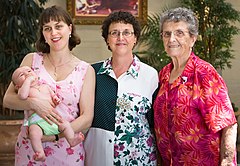
Back جيل Arabic Nəsil Azerbaijani Kapag-arakian BCL Пакаленне Byelorussian Пакаленьне BE-X-OLD Поколение Bulgarian প্রজন্ম Bengali/Bangla Generacija BS Generació Catalan Generace Czech

A generation is all of the people born and living at about the same time, regarded collectively.[1] It also is "the average period, generally considered to be about 20–30 years, during which children are born and grow up, become adults, and begin to have children."[2] In kinship, generation is a structural term, designating the parent–child relationship. In biology, generation also means biogenesis, reproduction, and procreation.
Generation is also a synonym for birth/age cohort in demographics, marketing, and social science, where it means "people within a delineated population who experience the same significant events within a given period of time."[3] The term generation in this sense, also known as social generations, is widely used in popular culture and is a basis of sociological analysis. Serious analysis of generations began in the nineteenth century, emerging from an increasing awareness of the possibility of permanent social change and the idea of youthful rebellion against the established social order. Some analysts believe that a generation is one of the fundamental social categories in a society; others consider generation less important than class, gender, race, and education.
- ^ "Definition of Generation". Oxford Advanced Learners' Dictionary.
- ^ "Generational Insights and the Speed of Change". American Marketing Association. 30 June 2022. Archived from the original on 11 April 2021. Retrieved 26 July 2024.
- ^ Pilcher, Jane (September 1994). "Mannheim's Sociology of Generations: An undervalued legacy" (PDF). British Journal of Sociology. 45 (3): 481–495. doi:10.2307/591659. JSTOR 591659. Archived (PDF) from the original on 29 March 2017. Retrieved 10 October 2012.